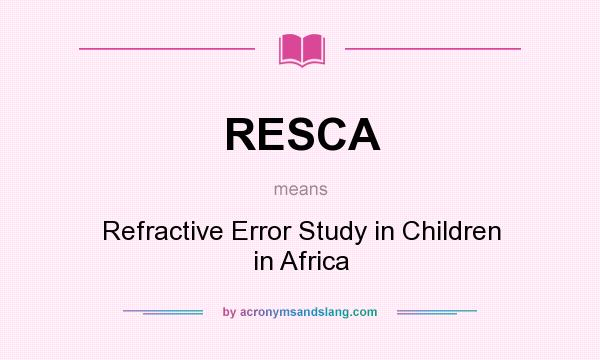What does RESCA mean?
RESCA means Refractive Error Study in Children in Africa
This acronym/slang usually belongs to Undefined category.
What is the abbreviation for Refractive Error Study in Children in Africa?
Refractive Error Study in Children in Africa can be abbreviated as RESCA

|
|
Most popular questions people look for before coming to this page
| Q: A: |
What does RESCA stand for? RESCA stands for "Refractive Error Study in Children in Africa". |
| Q: A: |
How to abbreviate "Refractive Error Study in Children in Africa"? "Refractive Error Study in Children in Africa" can be abbreviated as RESCA. |
| Q: A: |
What is the meaning of RESCA abbreviation? The meaning of RESCA abbreviation is "Refractive Error Study in Children in Africa". |
| Q: A: |
What is RESCA abbreviation? One of the definitions of RESCA is "Refractive Error Study in Children in Africa". |
| Q: A: |
What does RESCA mean? RESCA as abbreviation means "Refractive Error Study in Children in Africa". |
| Q: A: |
What is shorthand of Refractive Error Study in Children in Africa? The most common shorthand of "Refractive Error Study in Children in Africa" is RESCA. |
Abbreviations or Slang with similar meaning
- ABEDA - Arab Bank for Economic Development in Africa
- CABECA - Capacity Building for Electronic Communication in Africa
- CAFWA - Community Action Fund for Women in Africa
- COMARAF - Coastal Marine Research and Training in Africa
- CRIAA - Centre for Research Information Action in Africa
- COHEDA - Community Health Education and Development in Africa
- WLDA - Women in Law and Development in Africa
- CARE - Children of Africa Relief Education
- COADI - Children of Africa Development Initiative
- IAS - In Africa the Status
- NCSA - National Consortium for Study in Africa
- REC - refractive error change
- REWG - Refractive Error Working Group
- SCD - Study of Children
- SIF - Study in Finland
- SKP - Study in Kyoto Program
- SWEN - Study in Software Engineering
- WILDAF - Women in Law in Development in Africa
- RE - refractive error
- ACRWC - children's rights in Africa